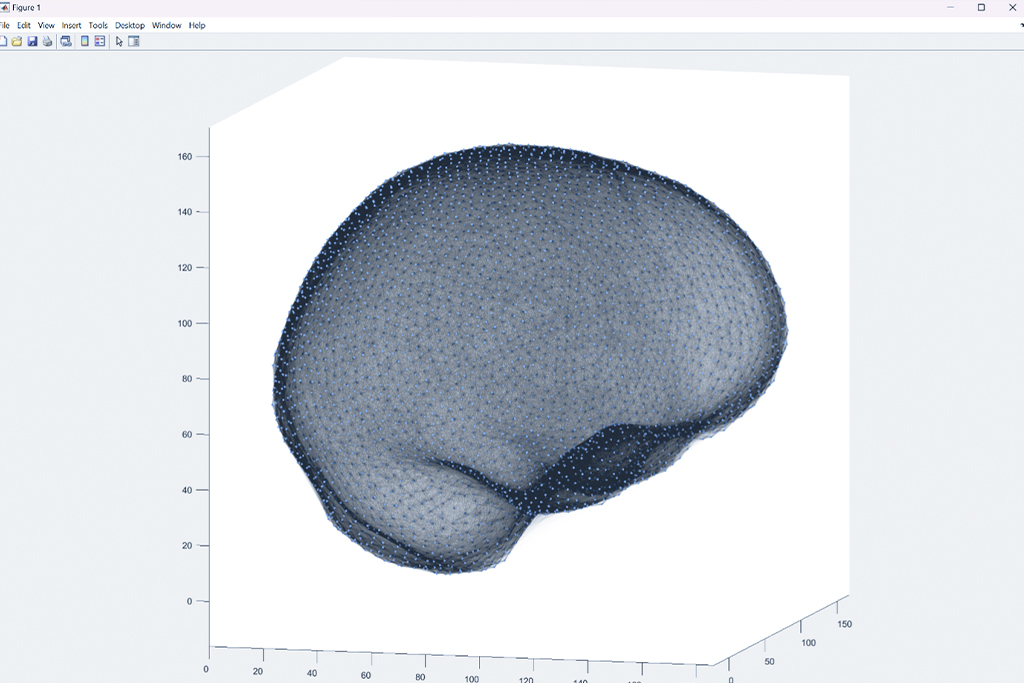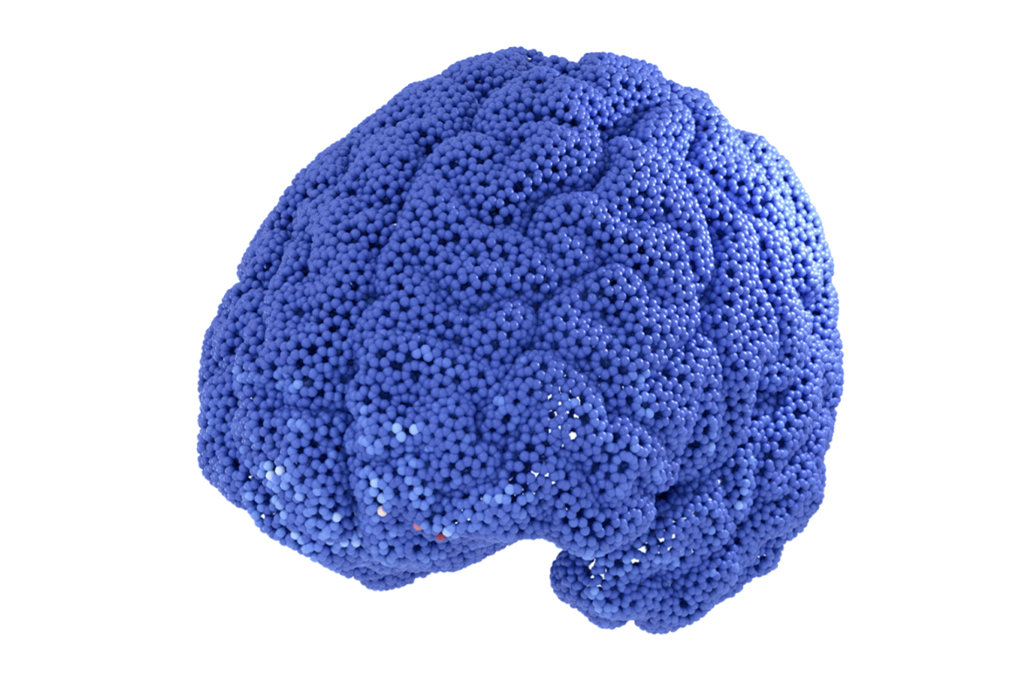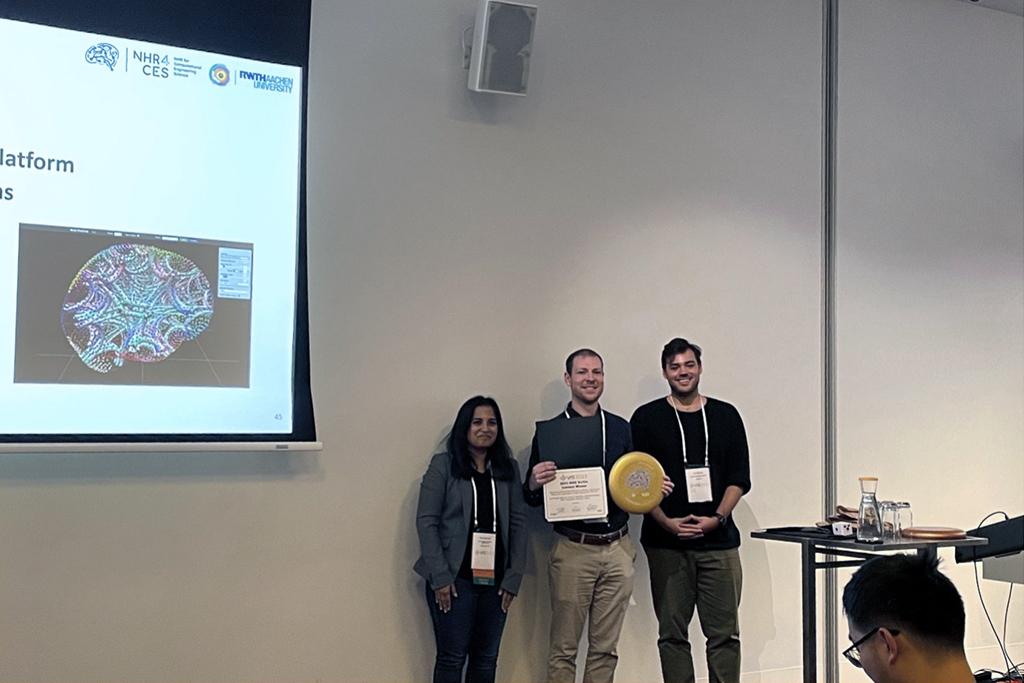Collaboration within NHR4CES Makes Brain Data Available for All
Supporting scientists in developing and optimizing tools for their respective research by providing high-performance infrastructure is only one of NHR4CES’ goals. The network of interdisciplinary experts also allows to challenge current practices by bringing in new perspectives. An example of this can now be observed by the collaboration of our CSG Parallelism and Performance and our CSG Visualization, who investigated new ways to analyze simulations of neural connections in the human brain:
To better understand the connections and changes that happen within a human’s brain, scientists make use of large-scale simulations that try to represent the real processes as close as possible and the CSG Parallelism and Performance has enabled several new endeavors in this regard ([1, 2]). This allows researchers to test out hypotheses and gain insights into how different events, such as learning or receiving an injury, can change structures and inner workings of the brain. For an effective and explorative analysis, however, modern and efficient tools are required to evaluate and improve the models, which is exactly where the CSG Visualization is working to support scientist ([3, 4]).
The IEEE SciVis Contest, which is an annually held contest at the IEEE VIS conference, the world’s largest conference on visualization, seeks to find novel solutions to data challenges and reaches visualization scientists around the world. It offers interesting, timely, and often complex data that is usually restricted and hard to come by. Tim Gerrits from the CSG Visualization co-chaired and organized the contest in 2023 and saw the potential within teaming up with Fabian Czappa from the CSG Parallelism and Performance for this occasion. The two groups worked together to simulate and create an ensemble of brain simulation results, which represent different phenomena and made the data publicly available ([5]. They discussed challenges and requirements that arose with the data which were then introduced to the SciVis Contest. For a full year, research teams from all over the world worked with the data and tried to create new and efficient ways to handle the complex data set. Due to the interesting data background, the participation was very high, with a high number of data requests, questions, and discussions that resulted from the release.
The impressive results, which can be seen online, ranged from immersive VR applications to multi-platform analysis tools and were presented at the 2023 IEEE VIS conference in Melbourne, Australia. The contest resulted in completely novel tools which allowed to find patterns and structures within the data that could not be seen beforehand. The winning entry was decided through a jury of visualization and neuroscience experts including Fabian Czappa and Tim Gerrits, and was invited to publish a journal article in the prestigious “Computer Graphics and Applications” journal.
Even though the contest is over, the data will remain publicly available and the CSG Visualization has already prepared a new data challenge for the next contest, which happens in October of 2024.


[1] Czappa, F., Geiß, A., Wolf, F. “Simulating structural plasticity of the brain more scalable than expected.” Journal of Parallel and Distributed Computing 171 (2023): 24-27.
[2] Nöttgen, H., Czappa, F., Wolf, F. „Accelerating Brain Simulations with the Fast Multipole Method.” Euro-Par 2022: Parallel Processing. Euro-Par 2022. Lecture Notes in Computer Science, vol 13440. Springer, Cham.
[3] Krüger, M., Li, Q., Kuhlen, T. W., Gerrits, T. “A Case Study on Providing Immersive Visualization for Neuronal Network Data Using COTS Soft- and Hardware”, 2023 IEEE Conference on Virtual Reality and 3D User Interfaces Abstracts and Workshops (VRW), Shanghai, China, 2023, pp. 201-205, doi: 10.1109/VRW58643.2023.00050.
[4] Krüger, M., Oehrl, S., Kuhlen, T.W., Gerrits, T. „A Case Study on Providing Accessibility-Focused In-Transit Architectures for Neural Network Simulation and Analysis”, High Performance Computing. ISC High Performance 2023. Lecture Notes in Computer Science, vol 13999. Springer, Cham. https://doi.org/10.1007/978-3-031-40843-4_21
[5] Gerrits, T., Czappa, F., Banesh, D., & Wolf, F. “IEEE SciVis Contest 2023 – Dataset of Neuronal Network Simulations of the Human Brain” (1.0) [Data set]. Zenodo. https://doi.org/10.5281/zenodo.10519411
